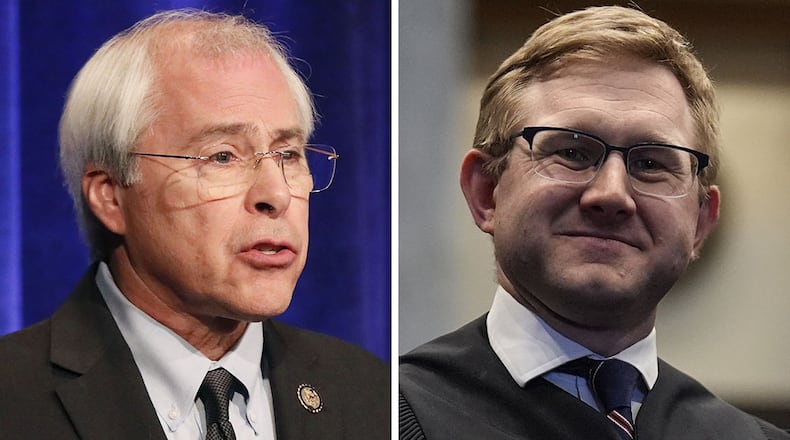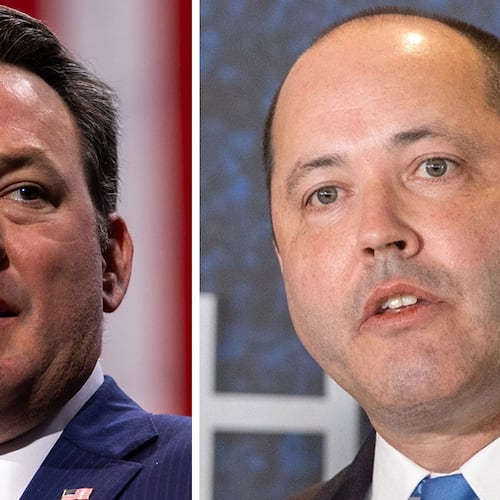Former U.S. Rep. John Barrow filed a federal lawsuit Monday to block the state’s judicial watchdog agency from seeking misconduct charges against him for centering his campaign for a seat on the Georgia Supreme Court on a pledge to support abortion rights.
The lawsuit came days after the Judicial Qualifications Commission informed the former Democratic lawmaker he was facing a complaint for pledging to “protect” abortion rights against a 2019 Republican-backed state law that restricts the procedure.
In the five-page letter, the agency said Barrow had the right to state his views on partisan or disputed issues. But it said he violated the Judicial Code of Conduct by making “misleading” pledges to protect selected rights and promises about “highly sensitive cases” likely to come before the state’s top court. It urged him to immediately change his campaign message.
Barrow’s lawsuit challenging the code said he is “suffering irreparable harm” from the complaint ahead of the May 21 vote. It asked a federal judge to block the judicial agency from sanctioning him on grounds that it violates his free speech rights.
It’s the latest development in one of the most unusual — and closely watched — Georgia judicial races in a generation as Barrow challenges Justice Andrew Pinson, who was Gov. Brian Kemp’s surprise 2022 pick to fill a vacant seat.
Over nearly two centuries, almost all the sitting Georgia Supreme Court justices who have sought another term have won their elections. Barrow, a former five-term Democratic lawmaker, might have the best chance in decades to upend that tradition.
He is bucking convention by treating the nonpartisan contest like a political campaign, telling audiences he supports abortion rights because, as he said at a North Fulton County Democrats forum, “politicians shouldn’t be making your personal health care decisions.”
“I’m running because I believe that women have the same rights today under our state constitution that they used to have under Roe v. Wade,” he said last week at the crowded forum.
Pinson, meanwhile, has run a more traditional campaign by avoiding speaking directly about issues that could come before the court while talking broadly about his philosophy.
“I’m a judge, not a politician,” said Pinson, who was appointed to the bench by Kemp after serving as the state solicitor general. “Folks understand that what makes a good judge doesn’t really have to do with partisanship or politics.”
Pinson is the only one of the four justices up for a six-year term this election to face an opponent, and the odds are in his favor. Every incumbent Georgia Supreme Court justice seeking reelection has won since 1922.
But Barrow is banking on voter outrage over abortion limits to fuel his campaign. He has repeatedly linked Pinson to the anti-abortion law, calling him an architect of the state’s restrictions due to his previous role as a state attorney. He is also emphasizing his experience in public office. Barrow’s name is familiar to many Georgians after serving five terms in Congress and narrowly losing a 2018 bid for secretary of state.
Barrow’s legal challenge takes aim at the complex code that governs judicial candidates and bars them from making false or misleading statements, or accusations with “reckless disregard.”
Under the code, a three-person committee of the judicial agency is set up each election year to review allegations of misconduct. It can then refer complaints about judicial candidates to a full investigative panel, which has the power to reprimand, censure, suspend or remove a judge. The committee’s May 1 letter to Barrow pressed him to revise his messages, ads, website and other materials or face penalties.
Other judicial leaders have raised sharp concerns about Barrow’s approach. A letter signed by five former Georgia Supreme Court justices and 10 past presidents of the State Bar of Georgia encouraged voters to “demand that our judges be nonpartisan and refrain from making public commitments about how they will decide cases and issues.”
”The alternative is a partisan judiciary that is emboldened to put campaign promises and personal preferences above the Constitution and the law,” the letter states. ”The alternative would mean the end of the rule of law, and if our state starts down that path, we fear that it will be very difficult to turn back later.”
When pressed on the issue last week during an appearance on the “Politically Georgia” podcast, Barrow cited a U.S. Supreme Court ruling that banned states from restricting judicial candidates from discussing certain controversial issues as they seek elected office.
Barrow’s attorney, Lester Tate, said the Alabama Supreme Court’s recent decision restricting in vitro fertilization served as a reminder that reproductive rights are among the questions at the “forefront of every voter’s mind” this election.
“John Barrow has a constitutional right to speak out about his views on the Georgia Constitution and the rights that constitution gives women in making important health care decisions,” Tate said.
“If the JQC wants to deprive John of that right, they’ll have to explain it in federal court,” Tate added. “He will not be bullied into silence by the JQC or any other governmental entity.”
Credit: Jason Getz / Jason.Getz@ajc.com
Credit: Jason Getz / Jason.Getz@ajc.com
About the Author
Keep Reading
The Latest
Featured





